Philips 2010 Annual Report Download - page 218
Download and view the complete annual report
Please find page 218 of the 2010 Philips annual report below. You can navigate through the pages in the report by either clicking on the pages listed below, or by using the keyword search tool below to find specific information within the annual report.-
 1
1 -
 2
2 -
 3
3 -
 4
4 -
 5
5 -
 6
6 -
 7
7 -
 8
8 -
 9
9 -
 10
10 -
 11
11 -
 12
12 -
 13
13 -
 14
14 -
 15
15 -
 16
16 -
 17
17 -
 18
18 -
 19
19 -
 20
20 -
 21
21 -
 22
22 -
 23
23 -
 24
24 -
 25
25 -
 26
26 -
 27
27 -
 28
28 -
 29
29 -
 30
30 -
 31
31 -
 32
32 -
 33
33 -
 34
34 -
 35
35 -
 36
36 -
 37
37 -
 38
38 -
 39
39 -
 40
40 -
 41
41 -
 42
42 -
 43
43 -
 44
44 -
 45
45 -
 46
46 -
 47
47 -
 48
48 -
 49
49 -
 50
50 -
 51
51 -
 52
52 -
 53
53 -
 54
54 -
 55
55 -
 56
56 -
 57
57 -
 58
58 -
 59
59 -
 60
60 -
 61
61 -
 62
62 -
 63
63 -
 64
64 -
 65
65 -
 66
66 -
 67
67 -
 68
68 -
 69
69 -
 70
70 -
 71
71 -
 72
72 -
 73
73 -
 74
74 -
 75
75 -
 76
76 -
 77
77 -
 78
78 -
 79
79 -
 80
80 -
 81
81 -
 82
82 -
 83
83 -
 84
84 -
 85
85 -
 86
86 -
 87
87 -
 88
88 -
 89
89 -
 90
90 -
 91
91 -
 92
92 -
 93
93 -
 94
94 -
 95
95 -
 96
96 -
 97
97 -
 98
98 -
 99
99 -
 100
100 -
 101
101 -
 102
102 -
 103
103 -
 104
104 -
 105
105 -
 106
106 -
 107
107 -
 108
108 -
 109
109 -
 110
110 -
 111
111 -
 112
112 -
 113
113 -
 114
114 -
 115
115 -
 116
116 -
 117
117 -
 118
118 -
 119
119 -
 120
120 -
 121
121 -
 122
122 -
 123
123 -
 124
124 -
 125
125 -
 126
126 -
 127
127 -
 128
128 -
 129
129 -
 130
130 -
 131
131 -
 132
132 -
 133
133 -
 134
134 -
 135
135 -
 136
136 -
 137
137 -
 138
138 -
 139
139 -
 140
140 -
 141
141 -
 142
142 -
 143
143 -
 144
144 -
 145
145 -
 146
146 -
 147
147 -
 148
148 -
 149
149 -
 150
150 -
 151
151 -
 152
152 -
 153
153 -
 154
154 -
 155
155 -
 156
156 -
 157
157 -
 158
158 -
 159
159 -
 160
160 -
 161
161 -
 162
162 -
 163
163 -
 164
164 -
 165
165 -
 166
166 -
 167
167 -
 168
168 -
 169
169 -
 170
170 -
 171
171 -
 172
172 -
 173
173 -
 174
174 -
 175
175 -
 176
176 -
 177
177 -
 178
178 -
 179
179 -
 180
180 -
 181
181 -
 182
182 -
 183
183 -
 184
184 -
 185
185 -
 186
186 -
 187
187 -
 188
188 -
 189
189 -
 190
190 -
 191
191 -
 192
192 -
 193
193 -
 194
194 -
 195
195 -
 196
196 -
 197
197 -
 198
198 -
 199
199 -
 200
200 -
 201
201 -
 202
202 -
 203
203 -
 204
204 -
 205
205 -
 206
206 -
 207
207 -
 208
208 -
 209
209 -
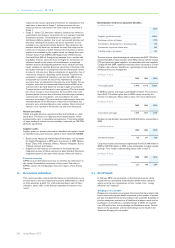 210
210 -
 211
211 -
 212
212 -
 213
213 -
 214
214 -
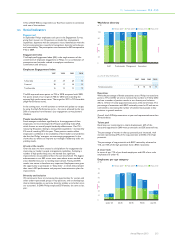 215
215 -
 216
216 -
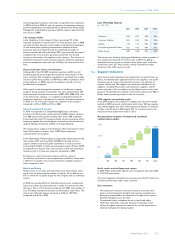 217
217 -
 218
218 -
 219
219 -
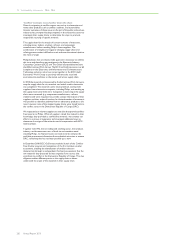 220
220 -
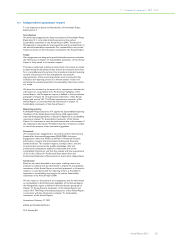 221
221 -
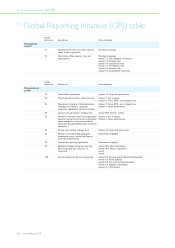 222
222 -
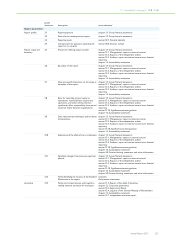 223
223 -
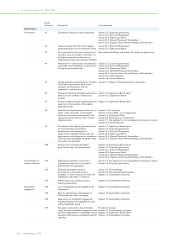 224
224 -
 225
225 -
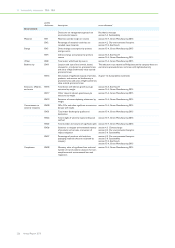 226
226 -
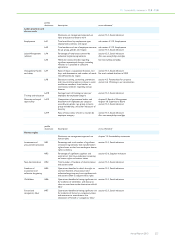 227
227 -
 228
228 -
 229
229 -
 230
230 -
 231
231 -
 232
232 -
 233
233 -
 234
234 -
 235
235 -
 236
236 -
 237
237 -
 238
238 -
 239
239 -
 240
240 -
 241
241 -
 242
242 -
 243
243 -
 244
244 -
 245
245 -
 246
246 -
 247
247 -
 248
248 -
 249
249 -
 250
250
 |
 |

15 Sustainability statements 15.6 - 15.6
218 Annual Report 2010
Limited tolerance
• Lack of adequate management systems to safeguard compliance with
the EICC code for labor and ethics, health and safety and
environment
• Wages and benefits: payment of overtime premiums
Number of audits and non-compliances per country
Location initial audits 2010 continued conformance
audits 2010 workers employed at
sites audited in 20101)
average number of
limited tolerance non-
compliances 20102)
average number of zero
tolerance non-
compliances 20102)
China 113 94 174,431 13 4
India 15 11 7,770 15 3
Indonesia 6 4 4,657 7 1
Philippines 1 − 1,627 8 6
Vietnam 2 − 42 10 −
Asia excluding China 24 15 14,096 12 3
Brazil 14 4 3,978 13 4
Mexico 7 − 2,096 17 6
LATAM 21 4 6,074 14 4
Ukraine 2 − 240 3 2
EMEA 2 − 240 3 2
Total 160 113 194,841 13 4
1) Based on information provided during audit
2) Average non-compliances per audit
The next table gives a detailed breakdown per non-compliance
category and per region of the percentage of audited suppliers where
such an issue was found.
During 2010 the majority of the zero tolerance issues were resolved
within the agreed deadlines. At the end of 2010 the identified zero
tolerance non-compliances were either resolved or within the agreed
deadline for resolution. For some zero-tolerance issues that needed
more time to resolve due to their complex nature, we agreed on an
extended deadline after detailed corrective action plans were reviewed
by the auditors. During 2010 for 14 supplier sites the phase-out
decision was taken due to, amongst others, a lack of sustainability
improvements.
China
In 2010, we conducted 207 full-scope audits in China. The major issues
identified during this year’s audits are working hours and wages and
benefits, emergency preparedness, occupational safety, hazardous
waste handling and management systems.
Working hours
Working hour issues continue to be the number one challenge among
suppliers in China due to the socio-economic climate, the economic
recovery in combination with labor shortages, especially in the
southern part of China.
In 2010 we piloted a program together with 5 Chinese suppliers to
better understand the rootcauses behind excessive overtime, ways to
structurally address the rootcauses and appropriate performance
indicators to monitor the resolution process.
More information on the Supplier Sustainability Involvement Program,
the EICC Code of Conduct and audit approach can be found at
www.philips.com/suppliers.
